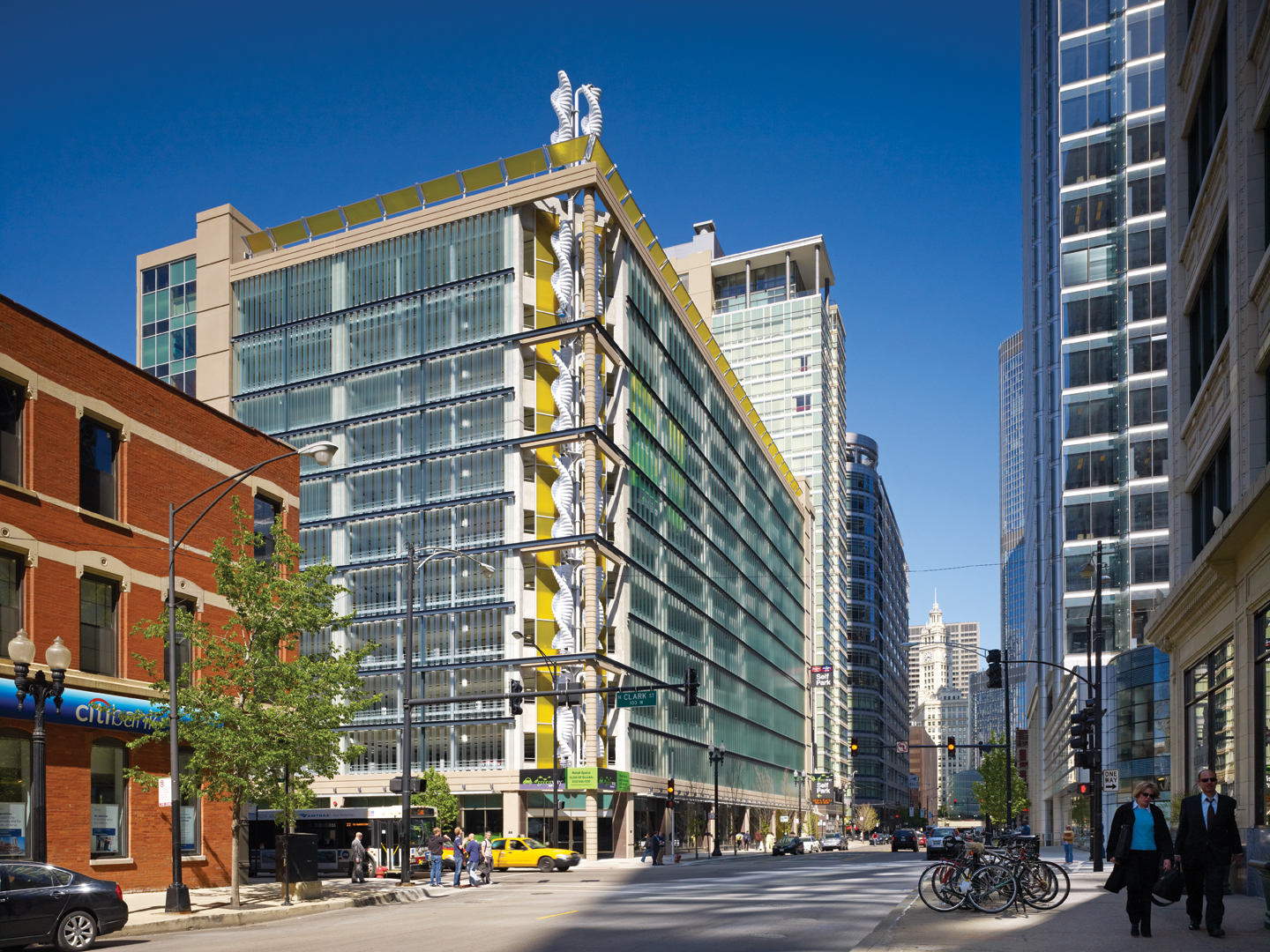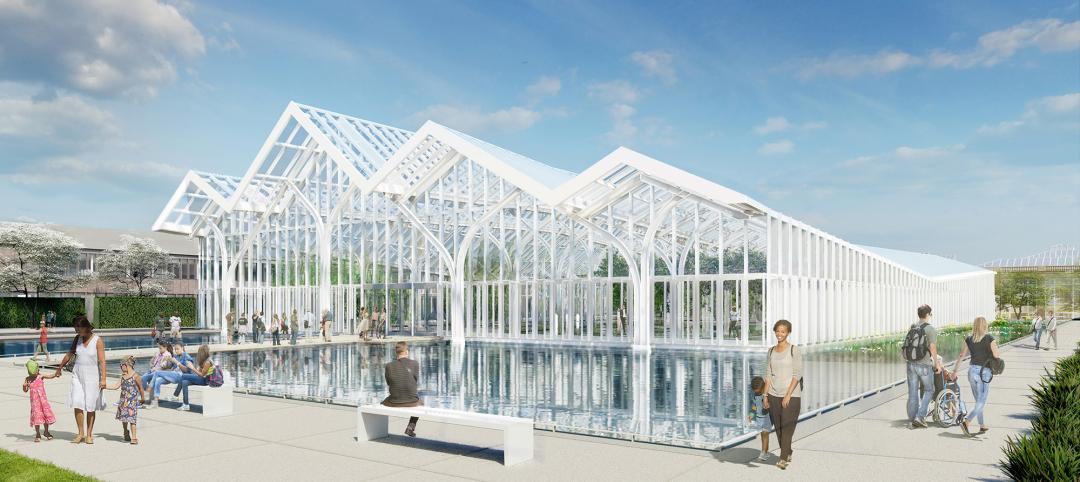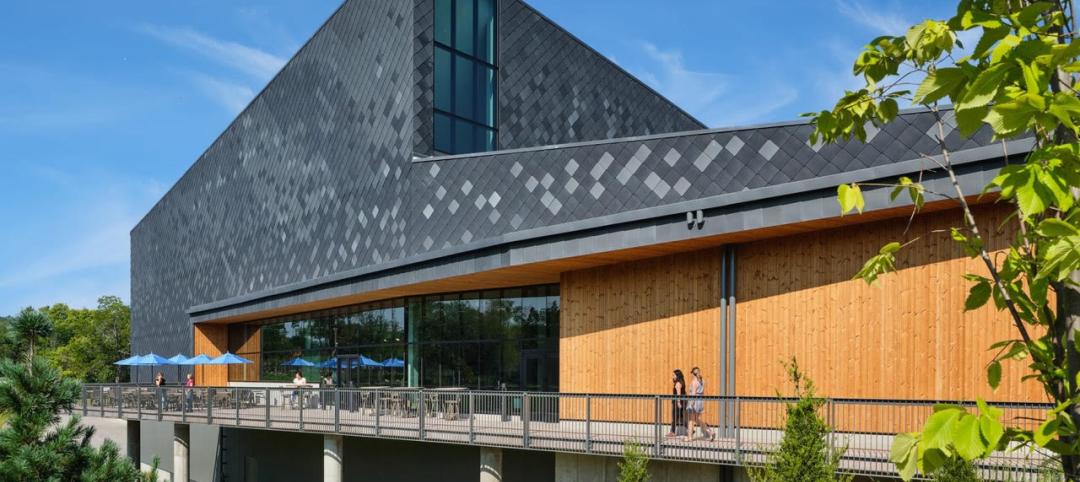The Greenway Self-Park in Chicago’s River North neighborhood shines like a beacon of enlightened green design on a block crowded with office and residential towers. The 285,000-sf parking structure’s green-tinted glass exterior doubles as a ventilation and daylighting system. Its signage gives parkers tips on how to live greener. River North developer Friedman Properties is planning a residential tower next door so that the parking garage’s green roof can serve as a garden for future condo owners.
What sets the 800-car parking structure apart, however, is its 12-paired array of wind turbines. The vertical axis turbines, manufactured by Helix Wind, Poway, Calif., are positioned on the southwest corner of the building near the relatively wide corridor of Clark Street, a busy thoroughfare. Todd Halamka, director of design at the Chicago office of HOK and lead designer on the project, calls the turbines “a kinetic and functional sculpture piece.”
Weather data from collection stations at O’Hare and Midway airports and weather buoys off of Chicago’s lakefront, coupled with wind tunnel tests taken from nearby buildings, were used to evaluate the amount of wind that could be harvested from the site. Estimates by the Building Team put the average wind at that corner at 10 mph at grade level over a year, which, according to the manufacturer, should be sufficient to generate electricity for the structure. The turbines, which extend from the second story to the very top of the structure on the southwest corner of the building, should generate enough power to light the building’s exterior and still send some energy back to the grid through the structure’s reversible electricity meter, Halamka said.
The first day I visited the site there was a strong breeze blowing in from the southwest and the long helical blades of the turbines, shaped from corrugated metal, appeared to be rotating quite actively. On another less windy day, however, they did not appear to be moving at all. Because the parking facility has only been open since September, not enough reliable data has been collected on how much power the turbines have generated.
The Building Team of designers HOK/Cubellis and general contractor Bovis Lend Lease took extra steps to green the parking structure. Greenway Self-Park’s signage gives garage users tips on living more sustainably. Each floor has a different nature theme, such as water, air, and earth conservation. The garage has electric-car charging stations and priority parking for hybrid gas/electric vehicles and for Zipcar and I-Go car-sharing vehicles. Its planned green roof has rainwater cisterns for water collection. Almost all of the building materials were locally sourced. Light sensors control the building’s interior lights and shut them off if enough daylight is coming through the translucent glass-walled exterior.
HOK says the building is registered with LEED and is currently in the commissioning process. “Rather than design a traditional closed garage which has an MEP system and has to run 24/7, working with the city of Chicago we were successful in creating a naturally ventilated garage,” Halamka said. Each floor maintains at least 20% open exterior wall area that provides natural ventilation. “We varied the openings (on the channel glassed walls) so that the glass panels have different spacing that creates a subtle visual tapestry, so that each façade takes advantage of the natural light and air,” he said.
As Chicago’s River North neighborhood continues to develop, Halamka says he believes a more sustainable urban strategy would be to build out the surrounding surface parking lots with ground-floor retail capped with office and residential space and then condense the parking into a more vertical arrangement that promotes local live-work opportunities. “Cars are an inevitable means of transportation,” said Halamka. “It is how we choose to live and use our vehicles in a more sustainable lifestyle that is important.”
For now, building-mounted wind harvesting like that at Greenway Self-Park is still in its infancy. HOK says both its Chicago office and building owner Friedman Properties are committed to monitoring exactly how much energy the wind turbines at the Greenway Self-Park are generating two years from now, when there will be enough data to gauge actual production. BD+C
Related Stories
Market Data | Apr 1, 2024
Nonresidential construction spending dips 1.0% in February, reaches $1.179 trillion
National nonresidential construction spending declined 1.0% in February, according to an Associated Builders and Contractors analysis of data published today by the U.S. Census Bureau. On a seasonally adjusted annualized basis, nonresidential spending totaled $1.179 trillion.
Affordable Housing | Apr 1, 2024
Biden Administration considers ways to influence local housing regulations
The Biden Administration is considering how to spur more affordable housing construction with strategies to influence reform of local housing regulations.
Affordable Housing | Apr 1, 2024
Chicago voters nix ‘mansion tax’ to fund efforts to reduce homelessness
Chicago voters in March rejected a proposed “mansion tax” that would have funded efforts to reduce homelessness in the city.
Standards | Apr 1, 2024
New technical bulletin covers window opening control devices
A new technical bulletin clarifies the definition of a window opening control device (WOCD) to promote greater understanding of the role of WOCDs and provide an understanding of a WOCD’s function.
Adaptive Reuse | Mar 30, 2024
Hotel vs. office: Different challenges in commercial to residential conversions
In the midst of a national housing shortage, developers are examining the viability of commercial to residential conversions as a solution to both problems.
Sustainability | Mar 29, 2024
Demystifying carbon offsets vs direct reductions
Chris Forney, Principal, Brightworks Sustainability, and Rob Atkinson, Senior Project Manager, IA Interior Architects, share the misconceptions about carbon offsets and identify opportunities for realizing a carbon-neutral building portfolio.
Reconstruction & Renovation | Mar 28, 2024
Longwood Gardens reimagines its horticulture experience with 17-acre conservatory
Longwood Gardens announced this week that Longwood Reimagined: A New Garden Experience, the most ambitious revitalization in a century of America’s greatest center for horticultural display, will open to the public on November 22, 2024.
Office Buildings | Mar 27, 2024
A new Singapore office campus inaugurates the Jurong Innovation District, a business park located in a tropical rainforest
Surbana Jurong, an urban, infrastructure and managed services consulting firm, recently opened its new headquarters in Singapore. Surbana Jurong Campus inaugurates the Jurong Innovation District, a business park set in a tropical rainforest.
Cultural Facilities | Mar 27, 2024
Kansas City’s new Sobela Ocean Aquarium home to nearly 8,000 animals in 34 habitats
Kansas City’s new Sobela Ocean Aquarium is a world-class facility home to nearly 8,000 animals in 34 habitats ranging from small tanks to a giant 400,000-gallon shark tank.
Market Data | Mar 26, 2024
Architecture firm billings see modest easing in February
Architecture firm billings continued to decline in February, with an AIA/Deltek Architecture Billings Index (ABI) score of 49.5 for the month. However, February’s score marks the most modest easing in billings since July 2023 and suggests that the recent slowdown may be receding.

















